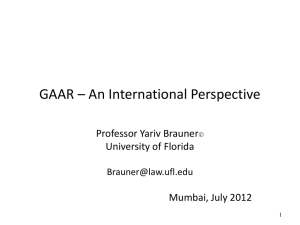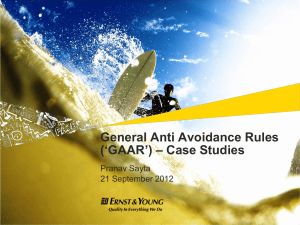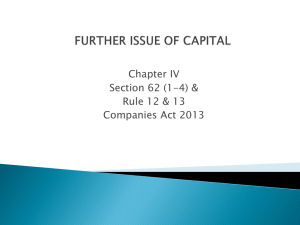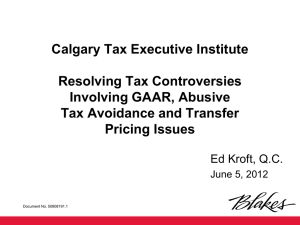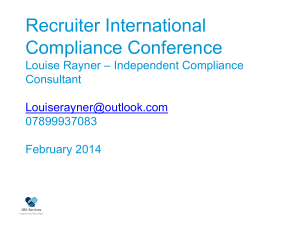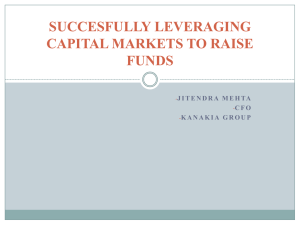Case Studies
advertisement
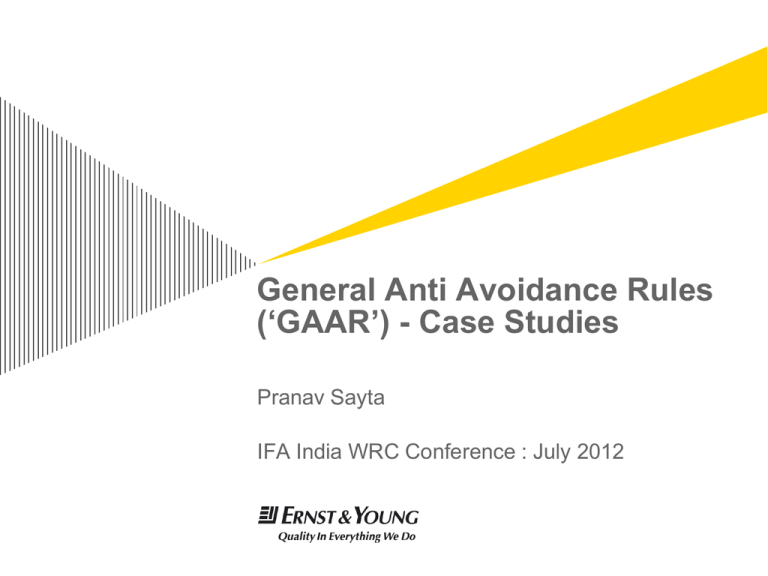
General Anti Avoidance Rules (‘GAAR’) - Case Studies Pranav Sayta IFA India WRC Conference : July 2012 GAAR : Case studies - Contents ► Case Study 1 : Inbound Investments from Mauritius ► Case Study 2 : Intra Group Reorganization ► Case Study 3 : Singapore based Group ► Case Study 4 : Private Equity Investment ► Case Study 5 : Buyback of Shares ► Case Study 6 : Funding by CCD’s & ECB’s ► Case Study 7 : Right to Choose? Page 2 GAAR – Case Studies Case study 1 – Inbound investment from Mauritius ► US Co is a company incorporated in the United States of America (‘USA’) and a tax resident of USA ► US Co is a global conglomerate having subsidiaries in various jurisdictions across the world ► US Co has set-up 100 percent subsidiary in Mauritius, M Co ► M Co is a tax resident of Mauritius, holding a tax residency certificate issued by the Mauritius Revenue Authorities ► M Co was set-up to act as a holding company for investments into India and other Asia Pacific countries ► M Co has two full time employees and has taken office premises on rent in Mauritius ► Board meetings of M Co are held in Mauritius once a quarter for taking business decisions Page 3 GAAR – Case Studies Case study 1 – Inbound investment from Mauritius ► US Co USA M Co has set-up 100 percent subsidiaries in India, I Co 1 and I Co 2 ► 100% Mauritius M Co 100% I Co 1 Page 4 I Co 2 Overseas company GAAR – Case Studies I Co 1 and I Co 2 are operating companies ► This structure has been in place since the year 2003 ► M Co sells the shares of I Co 1 in Financial Year (‘FY’) 2013-14 Case study 1 – Inbound investment from Mauritius Points for discussion ► Can GAAR be invoked by the tax authorities in the above case? ► ► Reasons on account of which GAAR can/ cannot be invoked What are the consequences in case GAAR is invoked by the tax authorities? Page 5 GAAR – Case Studies Case study 2 – Intra group reorganization ► US Co is a company incorporated in USA and a tax resident of USA ► US Co has a 100 percent subsidiary in Mauritius, M Co ► M Co is a tax resident of Mauritius, holding a tax residency certificate issued by the Mauritius Revenue Authorities ► M Co has a 100 percent subsidiary in India, I Co ► Page 6 I Co is an operating company GAAR – Case Studies Case study 2 – Intra group reorganization US Co ► 100% USA 100% S Hold Co M Co Mauritius 100% Sale of I Co shares Singapore Page 7 GAAR – Case Studies ► M Co had purchased the shares for Rs 10 in the year 2002 ► M Co sells the shares in December 2012 for Rs 100 ► S Hold Co is also a 100 percent subsidiary of US Co and is set-up to act as a holding company for Asia Pacific region ► Group has its regional headquarter in Singapore and also has significant operations in Singapore through S Op Co I Co India As part of the group reorganization, M Co sells shares of I Co to S Hold Co, a Singapore company in December 2012 at fair market value Case study 2 – Intra group reorganization US Co 100% ► S Hold Co and S Op Co are tax residents of Singapore, holding a tax residency certificate issued by the Singapore Revenue Authorities ► S Hold Co’s expenditure in the previous 2 years have been USD 225,000 per annum ► S Hold Co sells the shares of I Co in FY 2014-15 USA 100% S Hold Co M Co Mauritius Sale of I Co shares Singapore 100% I Co India Page 8 GAAR – Case Studies Case study 2 – Intra group reorganization Points for discussion ► Can GAAR be invoked by the tax authorities in the above case? ► ► Reasons on account of which GAAR can/ cannot be invoked What are the consequences in case GAAR is invoked by the tax authorities? Page 9 GAAR – Case Studies Case study 3 – Singapore based group ► S Co ► 100% S Co 1 100% Outside India S Co 1 is the group’s holding company for overseas business interests ► S Co and S Co 1 are tax residents of Singapore holding a tax residency certificate (TRC) issued by the Singapore Revenue Authorities ► S Co 1 has a subsidiary, M Co which has invested into India ► M Co is a tax resident of Mauritius, holding a TRC issued by the Mauritius Revenue Authorities ► M Co holds 100% shares of an Indian company I Co Inside India I Co Page 10 GAAR – Case Studies Group has significant business operations in Singapore ► M Co 100% S Co is the ultimate parent company of a Singapore based group and is an operating company Case study 3 – Singapore based group ► S Co 100% S Co 1 100% M Co Outside India 100% Inside India I Co Page 11 GAAR – Case Studies Negotiations are in progress with potential buyers which could result in: ► M Co selling the shares of I Co in FY 2013-14; or ► S Co 1 selling the shares of M Co in FY 2013-14 Case study 3 – Singapore based group Points for discussion ► Can GAAR be invoked by the tax authorities in the above case? ► ► Reasons on account of which GAAR can/ cannot be invoked What are the consequences in case GAAR is invoked by the tax authorities? Page 12 GAAR – Case Studies Case study 4 – Private Equity Investment Investor 1 Investor 2 Investor 3 M Co ► US based fund manager launches a Private Equity (PE) fund to raise capital from foreign investors for investment in India. The investors could be in various different jurisdictions. ► Due to regulatory reasons and commercial considerations, the foreign investors cannot individually invest directly into the Indian companies (I Cos) ► The fund manager has set-up an offshore vehicle, M Co, for pooling funds & investment into I Cos ► M Co is a tax resident of Mauritius, holding a tax residency certificate issued by the Mauritius Revenue Authorities Outside India Inside India I Cos Page 13 GAAR – Case Studies Case study 4 – Private Equity Investment Investor 1 Investor 2 ► M Co has engaged a US based fund manager as its investment manager ► The fund manager in turn has engaged an Indian company to act as an investment advisor in India ► All investment decisions are taken in the board meetings of M Co chaired from/held in Mauritius after considering the recommendations of US based fund manager ► Board of directors of M Co comprises representatives from US based fund manager, a couple of Mauritius residents and some independent (non Indian) directors ► M Co is likely to earn Capital Gains on sale of shares of I Cos Investor 3 M Co Outside India Inside India I Cos Page 14 GAAR – Case Studies Case study 4 – Private Equity Investment Points for discussion ► Can GAAR be invoked by the tax authorities in the above case? ► ► Reasons on account of which GAAR can/ cannot be invoked What are the consequences in case GAAR is invoked by the tax authorities? Page 15 GAAR – Case Studies Case study 5 – Buyback of shares ► US Co is a tax resident of USA and has invested into India through a subsidiary, M Co ► M Co is a tax resident of Mauritius, holding a tax residency certificate issued by the Mauritius Revenue Authorities ► M Co holds 90 percent of the shares of company in India, I Co and balance 10 percent is held by unrelated parties ► I Co has been paying 10 percent dividend regularly for last several years ► I Co has significant accumulated profits US Co 100% Unrelated parties M Co 90% Outside India Inside India Unrelated parties Page 16 10% I Co GAAR – Case Studies Case study 5 – Buyback of shares ► US Co 100% Unrelated parties Outside India Inside India Page 17 10% ► Idle cash is available with I Co ► There is a lack of good/convincing opportunities available for investment of idle cash ► Buy-back seems a worthwhile option as per current share valuation (i.e currently, shares of I Co are valued at less than their potential) M Co 90% Unrelated parties Board of directors of I Co believes inter alia : I Co GAAR – Case Studies ► While it is uncertain whether or not in the buy-back offer shares will be tendered by the unrelated parties, M Co is likely to tender shares in the buy-back offer Case study 5 – Buyback of shares Points for discussion ► Can GAAR be invoked by the tax authorities in the above case? ► ► Reasons on account of which GAAR can/ cannot be invoked What are the consequences in case GAAR is invoked by the tax authorities? Page 18 GAAR – Case Studies Case study 6 – Funding by Compulsorily Convertible Debentures (‘CCDs’) and External Commercial Borrowings (‘ECBs’) UK Co ► UK Co is a company incorporated in UK ► UK Co is a tax resident of UK, holding a tax residency certificate issued by the UK Revenue Authorities ► UK Co has a 100 percent subsidiary in Netherlands, N Co ► N Co is a tax resident of Netherlands, holding a tax residency certificate issued by the Netherlands Revenue Authorities ► N Co has a 100 percent subsidiary in India, I Co United Kingdom 100% N Co Netherlands 100% I Co Page 19 India GAAR – Case Studies Case study 6 – Funding by CCDs/ ECBs UK Co Netherlands 100% I Co Page 20 I Co had issued CCDs to N Co at a coupon rate of 10 percent ► CCDs were issued on 1 January 2010 ► CCDs are compulsorily convertible into equity shares of I Co on 31 December 2019 ► I Co has also borrowed (ECBs) on 1 January 2009 from N Co, repayable on 31 December 2013 ► I Co has been paying and will continue to pay interest on 31 December every year in respect of the ECBs and the CCDs (assume that the interest rate is at arms length & is compliant with exchange control regulations) United Kingdom 100% N Co ► India GAAR – Case Studies Case study 6 – Funding by CCDs/ ECBs UK Co Interest is claimed as an expense deduction and is also subjected to withholding tax ► Capital structure of I Co is as follows: United Kingdom 100% N Co ► Netherlands Page 21 India GAAR – Case Studies Equity – 10 ► Debt – 100 (CCDs of 60 and ECBs of 40) ► I Co requires further funds for business purposes and has accordingly, approached N Co ► I Co would be: 100% I Co ► ► issuing additional CCDs on 1 July 2013 of 20 ► Availing ECBs of 10 on 1 July 2013 Case study 6 – Funding by CCDs/ ECBs Points for discussion ► Can GAAR be invoked by the tax authorities in the above case? ► ► Reasons on account of which GAAR can/ cannot be invoked What are the consequences in case GAAR is invoked by the tax authorities? Page 22 GAAR – Case Studies Case study 7 – Right to choose? ► Shareholder (S) Unlisted Indian company Page 23 S has acquired shares in an unlisted Indian company as follows: Year Particulars No of shares Cost per share (in Rs) 2007 Purchase 25 10 2009 Bonus 25 - 2010 Rights 50 100 ► Above shares in unlisted Indian company are held in dematerialized form in a demat account ► S is contemplating sale of 40 shares ► S transfers 50 shares from the above demat account 1, into a new demat account 2 ► S thereafter sells 40 shares for Rs 125 per share & transfers/delivers 40 shares to the buyer’s demat account from his old demat account 1 GAAR – Case Studies Case study 7 – Right to choose? Points for discussion ► How will the Capital Gains of S be computed? ► Can GAAR be invoked by the tax authorities in the above case? ► ► Reasons on account of which GAAR can/ cannot be invoked What are the consequences in case GAAR is invoked by the tax authorities? Page 24 GAAR – Case Studies Case study 7 – Right to choose? Points for discussion : Is a Taxpayer entitled to exercise a choice so as to mitigate his taxes? For eg: ► Choosing to do a Slump sale or an Itemised sale or a Demerger plus share sale ► Choosing to sell shares of a WOS (wholly owned subsidiary) or the WOS selling the business ► Choosing to do business in the form of an LLP or a Company ► Having earned a Capital Gain, selling an asset whose value has dropped, in order to obtain set off of resulting loss ► Etc, …. Page 25 GAAR – Case Studies Thank You
